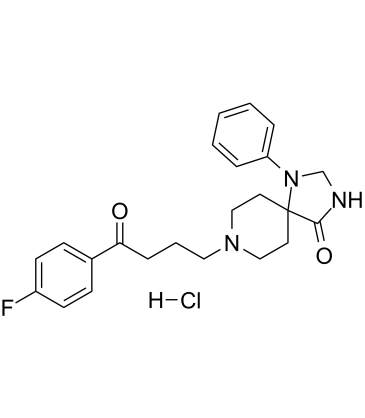2022-29-9
| Name | Spiperone hydrochloride |
|---|
| Description | Spiperone hydrochloride (Spiroperidol hydrochloride) is a selective dopamine D2 receptor (Ki values of 0.06 nM, 0.6 nM, 0.08 nM, ~350 nM, ~3500 nM for D2, D3, D4, D1 and D5 receptors, respectively) and 5-HT2A/5-HT1A receptor (Kis of 1 nM/49 nM) antagonist. Spiperone hydrochloride is also a selective α1B-adrenoceptor antagonist. Spiperone hydrochloride activates calcium-activated chloride channel (CaCC). Antipsychotic and anti-inflammatory activities[1][2][3][4][5]. |
|---|---|
| Related Catalog | |
| Target |
D2 Receptor:0.06 nM (Ki) D1 Receptor:~350 nM (Ki) D3 Receptor:0.6 nM (Ki) D4 Receptor:0.08 nM (Ki) D5 Receptor:~3500 nM (Ki) 5-HT2A Receptor:1 nM (Ki) 5-HT1A Receptor:49 nM (Ki) α1B-adrenoceptor Calcium-activated chloride channel |
| In Vitro | Spiperone is a potent intracellular Ca2+ enhancer (EC50=9.3 μM) and stimulates intracellular Ca2+ through a protein tyrosine kinase-coupled phospholipase C-dependent pathway, which results in increased secretion of Cl- in Calu-3 and CFBE41o- cell monolayers[2]. Spiperone significantly decreases the production of nitric oxide in lipopolysaccharide-stimulated BV-2 microglia cells, primary microglia and primary astrocyte cultures. Spiperone also significantly inhibits nitric oxide production in ATP-stimulated primary microglia cultures. Spiperone markedly decreases the production of TNF-α in BV-2 microglia cells. Spiperone attenuates the expression of inducible nitric oxide synthase and proinflammatory cytokines such as IL-1β and TNF-α at mRNA levels in BV-2 microglia cells[3]. |
| In Vivo | Spiperone (1.5 mg/kg; intraperitoneal injection; on days 1, 3, 6, 7, and 13-21; C57Bl/6 mice) treatment reduces infiltration of the alveolar interstitium and alveolar ducts with inflammatory cells and prevents the growth of the connective tissue in the parenchyma of Bleomycin lungs[6]. Animal Model: C57Bl/6 mice (7-8-week-old) induced pulmonary fibrosis by Bleomycin[6] Dosage: 1.5 mg/kg Administration: Intraperitoneal injection; on days 1, 3, 6, 7, and 13-21 Result: Reduced infiltration of the alveolar interstitium and alveolar ducts with inflammatory cells and prevented the growth of the connective tissue in the parenchyma of bleomycin lungs. |
| References |
[1]. P Seeman, et al. Dopamine receptor pharmacology. Trends Pharmacol Sci. 1994 Jul;15(7):264-70. |
| Molecular Formula | C23H27ClFN3O2 |
|---|---|
| Molecular Weight | 431.93 |
| Storage condition | -20°C |
